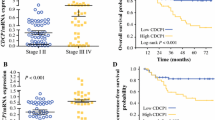Abstract
Background
Prefoldin 4 (PFDN4) is a transcriptional factor that regulates the cell cycle. PFDN4 is upregulated in breast tumor and breast cancer cell lines, but its significance in colorectal cancer (CRC) is not fully understood.
Methods
The present study assessed 129 patients who underwent surgery for CRC and assessed three cell lines derived from human CRC. The correlation of gene expression with clinical parameters in patients was assessed by knockdown experiments with these cell lines.
Results
Patients with high PFDN4 expression had a statistically relatively better prognosis, and those with low PFDN4 expression showed poorer overall survival than those with high expression. The assessment of PFDN4 knockdown in the three cell lines demonstrated that the siRNA inhibition resulted in a statistically significant increase in cell growth and invasiveness.
Conclusions
The data strongly suggest that PFDN4 expression is a prognostic factor in CRC.


Similar content being viewed by others
References
Jemal A, Siegel R, Ward E, et al. Cancer statistics, 2008. CA Cancer J Clin. 2008;58:71–96.
Jones OM, John SK, Horseman N, et al. Cause and place of death in patients dying with colorectal cancer. Colorectal Dis. 2007;9:253–7.
Kohno SI, Luo C, Nawa A, et al. Oncolytic virotherapy with an HSV amplicon vector expressing granulocyte-macrophage colony-stimulating factor using the replication-competent HSV type 1 mutant HF10 as a helper virus. Cancer Gene Ther. 2007;14:918–26.
Yamasaki M, Takemasa I, Komori T, et al. The gene expression profile represents the molecular nature of liver metastasis in colorectal cancer. Int J Oncol. 2007;30:129–38.
Aliaga JC, Deschenes C, Beaulieu JF, et al. Requirement of the MAP kinase cascade for cell cycle progression and differentiation of human intestinal cells. Am J Physiol. 1999;277(3 Pt 1):G631–41.
Yamatodani T, Ekblad L, Kjellen E, et al. Epidermal growth factor receptor status and persistent activation of Akt and p44/42 MAPK pathways correlate with the effect of cetuximab in head and neck and colon cancer cell lines. J Cancer Res Clin Oncol. 2009;135:395–402.
Collins C, Volik S, Kowbel D, et al. Comprehensive genome sequence analysis of a breast cancer amplicon. Genome Res. 2001;11:1034–42.
Vainberg IE, Lewis SA, Rommelaere H, et al. Prefoldin, a chaperone that delivers unfolded proteins to cytosolic chaperonin. Cell. 1998;93:863–73.
Japanese Society for Cancer of the Colon and Rectum. Guidelines for therapy of colorectal cancer (in Japanese). Tokyo: Kanehara Shuppan; 2005.
Sobin LH, Witedkind CH. International Union Against Cancer (UICC). TNM classification of malignant tumors. 5th ed. New York: Wiley-Liss; 1997. p. 66–9.
Christensen TG, Burke B, Dexter DL, Zamcheck N. Ultrastructural evidence of dimethylformamide-induced differentiation of cultured human colon carcinoma cells. Increased expression of desmosomes. Cancer. 1985;56:1559–65.
Ishizu K, Sunose N, Yamazaki K, et al. Development and characterization of a model of liver metastasis using human colon cancer HCT-116 cells. Biol Pharm Bull. 2007;30:1779–83.
Aznavoorian S, Liotta LA, Kupchik HZ. Characteristics of invasive and noninvasive human colorectal adenocarcinoma cells. J Natl Cancer Inst. 1990;82:1485–92.
Mimori K, Mori M, Shiraishi T, et al. Clinical significance of tissue inhibitor of metalloproteinase expression in gastric carcinoma. Br J Cancer. 1997;76:531–6.
Mori M, Staniunas RJ, Barnard GF, et al. The significance of carbonic anhydrase expression in human colorectal cancer. Gastroenterology. 1993;105:820–6.
Tsujino T, Seshimo I, Yamamoto H, et al. Stromal myofibroblasts predict disease recurrence for colorectal cancer. Clin Cancer Res. 2007;13:2082–90.
Lagers AM, Sier CF, Hawinkels LJ, et al. MMP-2 geno-phenotype is prognostic factor for colorectal cancer survival, whereas MMP-9 is not. Br J Cancer. 2008;98:1820–3.
Iijima M, Kano Y, Nohno T, Namba M. Cloning of cDNA with possible transcription factor activity at the G1-S phase transition in human fibroblast cell lines. Acta Med Okayama. 1996;50:73–7.
Hansen WJ, Cowan NJ, Welch WJ. Prefoldin-nascent chain complexes in the folding of cytoskeletal proteins. J Cell Biol. 1999;145:265–77.
Hodgson G, Hager JH, Volik S, et al. Genome scanning with array CGH delineates regional alterations in mouse islet carcinomas. Nat Genet. 2001;29:459–64.
Andre T, Quinaux E, Louvet C, et al. Phase III study comparing a semimonthly with a monthly regimen of fluorouracil and leucovorin as adjuvant treatment for stage II and III colon cancer patients: final results of GERCOR C96.1. J Clin Oncol. 2007;25:3732–8.
Wolpin BM. Mayer RJ. Systemic treatment of colorectal cancer. Gastroenterology. 2008;134:1296–310.
Kornmann M, Formentini A, Ette C, et al. Prognostic factors influencing the survival of patients with colon cancer receiving adjuvant 5-FU treatment. Eur J Surg Oncol. 2008;34:1316–21.
Bathe OF, Dowden S, Sutherland F, et al. Phase II study of neoadjuvant 5-FU + leucovorin + CPT-11 in patients with resectable liver metastases from colorectal adenocarcinoma. BMC Cancer. 2004;4:32.
Lacy AM, Garcia-Valdecasas JC, Delgado S, et al. Laparoscopy-assisted colectomy versus open colectomy for treatment of non-metastatic colon cancer: a randomised trial. Lancet. 2002;359:2224–9.
Weeks JC, Nelson H, Gelber S, et al. Short-term quality-of-life outcomes following laparoscopic-assisted colectomy vs open colectomy for colon cancer: a randomized trial. JAMA. 2002;287:321–8.
Clinical Outcomes of Surgical Therapy Study Group. A comparison of laparoscopically assisted and open colectomy for colon cancer. N Engl J Med. 2004;350:2050–9.
Jayne DG, Guillou PJ, Thorpe H, et al. Randomized trial of laparoscopic-assisted resection of colorectal carcinoma: 3-year results of the UK MRC CLASICC Trial Group. J Clin Oncol. 2007;25:3061–8.
Koshariya M, Jagad RB, Kawamoto J, et al. An update and our experience with metastatic liver disease. Hepatogastroenterology. 2007;54:2232–9.
Author information
Authors and Affiliations
Corresponding author
Electronic supplementary material
Below is the link to the electronic supplementary material.
Rights and permissions
About this article
Cite this article
Miyoshi, N., Ishii, H., Mimori, K. et al. Abnormal Expression of PFDN4 in Colorectal Cancer: A Novel Marker for Prognosis. Ann Surg Oncol 17, 3030–3036 (2010). https://doi.org/10.1245/s10434-010-1138-5
Received:
Published:
Issue Date:
DOI: https://doi.org/10.1245/s10434-010-1138-5




